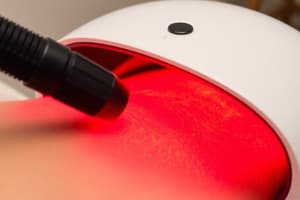Podcast
Questions and Answers
Which of the following is a contraindication for shortwave diathermy?
Which of the following is a contraindication for shortwave diathermy?
- Open wound or hemorrhage (correct)
- Burns
- Chronic inflammatory pelvic disease
- Synovitis
What is the primary purpose of shortwave diathermy in wound healing?
What is the primary purpose of shortwave diathermy in wound healing?
- To increase localized blood flow (correct)
- To reduce muscle spasm
- To decrease joint stiffness
- To precipitate gangrene
What is the recommended duration of shortwave diathermy treatment?
What is the recommended duration of shortwave diathermy treatment?
- 20-30 minutes (correct)
- 10-15 minutes
- 40-50 minutes
- 30-40 minutes
What is a potential danger of shortwave diathermy?
What is a potential danger of shortwave diathermy?
What is the recommended frequency of shortwave diathermy treatment?
What is the recommended frequency of shortwave diathermy treatment?
Which of the following is an indication for shortwave diathermy?
Which of the following is an indication for shortwave diathermy?
What is the purpose of the thermal dosage in shortwave diathermy?
What is the purpose of the thermal dosage in shortwave diathermy?
Which of the following is not a contraindication for shortwave diathermy?
Which of the following is not a contraindication for shortwave diathermy?
What is the effect of shortwave diathermy on muscle spasm?
What is the effect of shortwave diathermy on muscle spasm?
What is the recommended intensity of shortwave diathermy?
What is the recommended intensity of shortwave diathermy?
Flashcards are hidden until you start studying
Study Notes
Microwave Diathermy vs Short Wave Diathermy
- Heat production is more in muscles with microwave diathermy compared to short wave diathermy due to dependence on watery content of tissues.
- Microwave diathermy has a shallower penetration depth of 3 mm to 3 cm, whereas short wave diathermy can penetrate up to 6 cm.
Indications of Microwave Diathermy
- Traumatic and inflammatory conditions
- Degenerative arthropathies
- Enthesopathies
- Arthritis of joints
- Soft tissues and superficial joints
- Strains or sprains
- Muscle or tendon tears
- Stiffness of superficial joints
- Capsular lesions
- Rheumatic conditions
- Tenosynovitis or bursitis
- Infected surgical incisions
Contraindications of Microwave Diathermy
- Malignant tissue or tuberculosis
- Metal implants or pacemaker
- Over growing epiphysis
- Area of impaired sensation
- Eyes
- Male gonads
- Hemorrhage or thrombosis or phlebitis
- Pregnancy
- Over wet dressing or adhesive tapes
Dangers of Microwave Diathermy
- Burns
- Cataract
- Circulatory defects
Dosage of Microwave Diathermy
- Intensity should produce mild warmth (midthermal) or reduced to no warmth (subthermal or athermal)
- Duration of treatment: 5-10 minutes
Components of Short Wave Diathermy
- Oscillator
- Power amplifier
- Applicator
Modes of Application of Short Wave Diathermy
- Continuous Mode (CSWD)
- Pulsed Mode (PSWD)
Factors Influencing Selection or Placement of Electrodes
- Type of electrodes
- Size of electrodes
- Spacing of electrodes
- Positioning of electrodes
Types of Electrodes
- Pad electrodes
- Plate electrodes
- Disk electrodes
Effects of Short Wave Diathermy on Traumatic Conditions
- Reducing healing time
- Pain relief
- Reduction of muscle spasm
- Increased localized blood flow (wound healing)
Indications of Short Wave Diathermy
- Joint contractures
- Synovitis
- Chronic inflammatory or infective conditions
- Bursitis
- Tenosynovitis
Dangers of Short Wave Diathermy
- Burns
- Scalds
- Electric shock
- Overdose
- Precipitation of gangrene
- Faintness
- Giddiness
- Dangers to hearing aids or cardiac pacemakers
- Dangers to other equipment
Contraindications of Short Wave Diathermy
- Open wound or hemorrhage
- Metal in the tissue
- Disturbed skin sensation
- Venous thrombosis or thrombophlebitis
- Arterial diseases
- Menstruation
- Pregnancy
- Tumors
- Deep X-ray or cobalt therapy
- Children
- Mentally retarded patient
- Unconscious patient
- Epileptic patients
- Uncooperative patients
Dosage of Short Wave Diathermy
- Intensity should cause sufficient warmth (thermal dosage) of the tissues
- Duration of treatment: 20-30 minutes
- Treatment may be given daily or on an alternate day
Studying That Suits You
Use AI to generate personalized quizzes and flashcards to suit your learning preferences.



